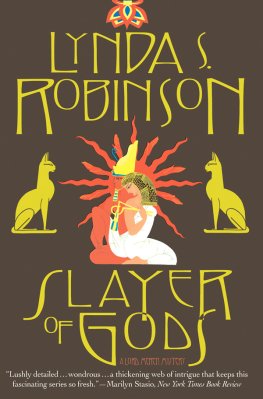Lynda Robinson - Drinker Of Blood
Here you can read online Lynda Robinson - Drinker Of Blood full text of the book (entire story) in english for free. Download pdf and epub, get meaning, cover and reviews about this ebook. genre: Detective and thriller. Description of the work, (preface) as well as reviews are available. Best literature library LitArk.com created for fans of good reading and offers a wide selection of genres:
Romance novel
Science fiction
Adventure
Detective
Science
History
Home and family
Prose
Art
Politics
Computer
Non-fiction
Religion
Business
Children
Humor
Choose a favorite category and find really read worthwhile books. Enjoy immersion in the world of imagination, feel the emotions of the characters or learn something new for yourself, make an fascinating discovery.

- Book:Drinker Of Blood
- Author:
- Genre:
- Rating:5 / 5
- Favourites:Add to favourites
- Your mark:
- 100
- 1
- 2
- 3
- 4
- 5
Drinker Of Blood: summary, description and annotation
We offer to read an annotation, description, summary or preface (depends on what the author of the book "Drinker Of Blood" wrote himself). If you haven't found the necessary information about the book — write in the comments, we will try to find it.
Drinker Of Blood — read online for free the complete book (whole text) full work
Below is the text of the book, divided by pages. System saving the place of the last page read, allows you to conveniently read the book "Drinker Of Blood" online for free, without having to search again every time where you left off. Put a bookmark, and you can go to the page where you finished reading at any time.
Font size:
Interval:
Bookmark:
Lynda S. Robinson
Drinker Of Blood
Historical Note
Drinker of Blood continues the story of Lord Meren's investigation of the murder of Queen Nefertiti, the wife of the heretic pharaoh Akhenaten. In the previous book, Eater of Souls, Meren discovered several suspects for the killing, but was distracted by the advent of a serial killer.
The events of these two novels are based in part on data from Egyptology that cover the reigns of several pharaohs- Amunhotep III (the Magnificent), Amunhotep IV/Akhenaten, Smenkhare (briefly), and Tutankhamun. However, these data are often open to different interpretations; even dates of reigns may vary from reference to reference, scholar to scholar. When opinions vary, I have had to choose an interpretation and stick with it, regardless of any new information that may come to light afterward.
The historical context of Drinker of Blood and the other Lord Meren novels begins with the family of Amunhotep III and Queen Tiye, early in the fourteenth century B.C. Amunhotep ruled peacefully for almost forty years, resting on the foundation of his conquering ancestors, who left him a far-flung and rich empire. His reign is known for its prosperity and great artistic achievements in building and sculpture. His chief wife, a nonroyal lady named Tiye, had at least six children. The oldest, Thutmose, died before he could inherit, leaving the second son, Amunhotep (Akhenaten), as the heir to the Egyptian throne.
This second son may have joined his father on the throne in a joint reign of some years, and it is this interpretation that holds in the Lord Meren series. Amunhotep IV changed his name early in his reign to Akhenaten, signaling a shift in religious emphasis, the nature of which is still being debated today. What is certain is that within a relatively short time, Akhenaten withdrew royal support from Egypt's king of the gods, Amun, in favor of a minor deity called the Aten, the sun disk through which life-giving light entered the world.
Around the same time changes in artistic style appear in Egypt-a so-called revolution that is hard for the modern reader to understand. In Egypt, as in the rest of the ancient world, art, religion, politics, and economics merged. There were no separate categories such as those we use for convenience today. Thus, when Akhenaten ascended the throne, and possibly before, he favored a new freedom and realism in artistic style that contrasted significantly with the old formal precepts of previous reigns. Many believe that this new style was a deliberate departure, perhaps Akhenaten's way of distinguishing himself and his god from all that came before.
As his reign progressed, Akhenaten seemed to grow more and more fanatical in his opposition to Amun. The king of the gods had benefited from royal patronage since-under the god's banner-Akhenaten's ancestors overthrew foreign rule and established the New Kingdom. The temple of Amun was rich beyond imagination, even owning foreign cities and slaves by the tens of thousands. Such a rich temple had to have been a rival to pharaoh's power. When Amun's position was threatened by a new god, perhaps the priests who benefited from that power fought back.
Whatever the reason, Akhenaten decided to uproot the royal court and government from the ancient capital of Memphis. He moved it away from the old gods, to a barren site between Thebes and Memphis, and built a new city- Horizon of the Aten. And there he remained, growing more and more adamant in his persecution of Amun, until he died.
Akhenaten's chief queen was the fabulously beautiful Nefertiti. This young woman played as prominent a role in the reliefs of her husband's reign as did her predecessor, Tiye. In fact, Nefertiti may have wielded a great deal of actual power. However, we do not know this for certain. She bore the king six daughters, and it is the affectionate scenes of the royal couple with their children that are among the most poignant in Egyptian art.
After the twelfth year of Akhenaten's reign, Queen Nefertiti's figure mysteriously vanishes from royal monuments. The reason for her disappearance is not certain. It could be that she died, but her status may have changed in some other way. Whatever the case she was buried in the eastern desert in the royal tomb at Horizon of the Aten.
Akhenaten followed his beautiful queen to the land of the dead a few years later. The pharaoh Smenkhare, who was the son of either Amunhotep III or Akhenaten, may have ruled briefly, but history knows the reign of the next king far better-that of the boy king Tutankhamun. Again it is uncertain whether Tutankhamun (first known as Tutankhaten) was Akhenaten's younger brother or his son. The boy succeeded to the throne of Egypt when he was between the ages of nine and sixteen and soon began a complete reversal of Akhenaten's policies. Under Tutankhamun the royal court and government moved back to Memphis, and Amun was restored. Tragically, Tutankhamun died young, between the ages nineteen and twenty-six after a reign of ten years, leaving his successors to carry out the changes he began.
The bare recital of historical facts given above only hints at the real mysteries facing Egyptologists to this day. Who were Tutankhamun's parents? Why did Akhenaten become such a revolutionary? What really happened to Nefertiti? With so many questions, so many enigmas, a novelist has a wealth of material with which to create a historical mystery. Drinker of Blood weaves the story of Lord Meren's investigation of Queen Nefertiti's death with the story of her life. I suspect, however, that what I have created may not be as strange and exotic as the truth-whatever that might be.
Prologue
Thebes, the reign of the pharaob Amunhotep the Magnificent
If the guards caught her, she would be dragged back to the palace and whipped.
The palm-fiber rope bit into her hands as she shinnied down its length. Her bare feet plopped against the mud-brick wall before she dropped to the ground behind a sycamore. In the night's shadows the guards wouldn't see her rope dangling behind the tree trunk.
Pebbles clicked together under the weight of a heavy tread. She crouched low at the base of the sycamore. Her chest tightened with apprehension. It was Mahu, one of the royal guards. Mahu disliked children and wouldn't keep silent the discovery of a small intruder. If Mahu found her, he'd drag her to Queen Tiye and delight in telling the whole palace that the daughter of the queen's brother had been trying to escape the grounds like a baseborn criminal.
Demons take the man. Mahu was headed straight for her palm.
The girl pressed her linen-clad body to the tree trunk and prayed to Amun. She heard a tap. Mahu leaned his spear against the tree where she crouched. The guard fumbled with his kilt. An arc of liquid shot out, and a pungent odor signaled the reason for this stop on Mahu's rounds. She squeezed her eyes shut and held her breath until Mahu finished relieving himself and trudged by on his way past a reflection pool.
Rubbing her palms on her skirt to rid them of sweat, the girl melted from her hiding place into the cool perfection of pharaoh's private garden. She must be across the causeway and on the riverbank soon or Webkhet would leave. She paused beside an incense tree and scanned the path to the palace. Bordered by rows of imported shrubs, it was deserted. She sprang away from the incense tree with the grace and agility that were part of the reason she was in so much trouble. Anxiety and grief clawed at her as she let herself in through the door of a robing chamber.
Tomorrow Webkhet would be gone, leaving her alone to face the destiny others had planned for her. That thought urged her on through chambers shrouded in darkness, through the informal audience chamber with its paintings of bound captives and its throne of ebony and sheet gold, through the outer hall that bristled with columns, to the courtyard, and out a concealed door in the wall that rose twelve cubits high. Soon she was running down the causeway, her lungs heaving and her legs numb from the pounding of bare feet on packed earth.
Font size:
Interval:
Bookmark:
Similar books «Drinker Of Blood»
Look at similar books to Drinker Of Blood. We have selected literature similar in name and meaning in the hope of providing readers with more options to find new, interesting, not yet read works.
Discussion, reviews of the book Drinker Of Blood and just readers' own opinions. Leave your comments, write what you think about the work, its meaning or the main characters. Specify what exactly you liked and what you didn't like, and why you think so.







